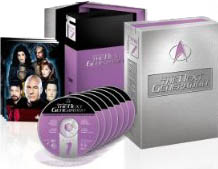Descent
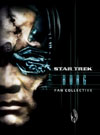
|
Star Trek definitely seemed to have hopes to recreate all the audience interest
it had received three years previously for "The Best of Both Worlds", judging
by all the hype and buzz concerning the return of the Borg for yet another
season finale cliffhanger. Sadly, things didn't work out so well this time,
and "Descent" turns out to be easily the least-effective of all the Borg stories
that were done for "The Next Generation" TV series.
|
"Descent" is actually the unhappy merger of two very different storylines,
which disagree sharply in terms of what they each give the regular characters
to do. The Borg story promises a canvas of the largest scope, with ship-to-ship
battles between Federation and Borg fleets, and a host of Federation colonies
at stake, if not Earth, Vulcan, and the core of the Federation itself. About half-way
through part 1, another ship brings Admiral Nechayev into Picard's office,
where she outlines what and when the massive Federation deployment will be,
and the trio of ships that will be under Picard's command. (Yes, once again
it seems apt that he should be promoted to commodore.) This plotline should
serve to keep all our regular characters at their battlestations on the ship.
In addition, there is the more personal story of Data and his brother Lore,
and how they are struggling over the emotion chip previously discovered in the
season four episode "Brothers". This story has a far smaller scope, nicely played
out in a couple of rooms in a quiet building, with Data's conscience-figure Picard,
his psychiatrist Troi, and his best friend Geordi all present and offering superb
support. In and of itself, the Lore story is the more successful of the two,
and indeed is the one that makes "Descent" essential viewing for the audience.
The real failure of "Descent" is the lack of logic bridging the regular's
attempts to deal with these two challenges. In essence, about ten minutes
before part 1 ends, the Borg plot vaporizes, and fails to reassert itself
at any point afterwards. Instead, we get the worst written scene of the
entire show, as Picard and Riker contemplate the departure of a shuttle
carrying Data and their former Borg prisoner. One says that they have
to take the risk to go after him, and the other readily agrees. What the hell!?
Why? This is so lacking an obvious reason, you'd think the two of them
could have a bit more debate to remind us why they think this personal
mission is so important in the midst of a struggle to safeguard all the
colonies of this sector. But an even bigger brain fart occurs from the writers.
Exactly why did they think it was a good idea to have all able-bodied
crewmembers from the Enterprise beam down to the planet? I really
don't know what the writers believed that was going to do for the story,
and indeed part 2 undoes this move before anything interesting has come from it.
And it's completely idiotic for both command officers - Picard and Riker -
to beam down, as their usual third-in-command - Mr. Data - was also off the ship.
Back in "The Best of Both Worlds", Troi cited a good textbook reminder of
why this kind of thing is additionally "inappropriate" in a "time of war".
A lot of the subsequent scenes that we get in the story would work fine in themselves,
except that they've all been "poisoned" by the failure of logic that has led the
characters to the places and situations that we find them in. It's harder to
invest in them.
A lot of the script's choices for dialogue are way off-point as well. This story
actually marks the debut of the Borg's transwarp conduits, which constitute
an interesting new sci-fi element for the story to look at. At one point
the Enterprise succeeds in following a Borg ship through one of these conduits,
emerging in another area of space. But where are we at that point? We've seen
our crew get similar unexpected boosts in tales like
"Where No One Has Gone Before" and
"Q Who", which are usually followed by
a scene or two of them figuring out
where they are, how far they've traveled, and what it all means stacked up
against the rest of their goals for that episode.
You know, EXPLORING, arguably the prime function of the science-fiction genre
and the stated purpose of Enterprise crewmember characters.
"Descent" bizarrely interrupts this exploration moment
as though the writer couldn't be bothered to figure out where they should be.
Delta quadrant, I wonder? Or somewhere much closer?
We do see an LCARS graphic of a conduit on a bridge monitor station
that postulates the Delta Quadrant lies on one end... but is that
the conduit we went through previously, or the one we're about to go through,
or a random, hypothetical one?
Only after a second trip through a conduit
do they take the time to figure out that it has shifted them 65 light years
from their last position.... typically not far enough to change quadrants.
Okay, great. But where was their last position?
And where are they now? Oddly, we never figure out what planet we spend
most of our time on, what star we get way too close to, or where we are.
Contrast this example of not getting something easy and cool that we need
with the amount of absolutely unintelligible technobabble that spews forth
about all kinds of uninteresting minutiae and dead-end tangents, and you have to
wonder how such a sloppy script was propped up as a season finale.
Ultimately, it seems to me that the writers were a little too happy to fly by
the seat of their pants for these 2-part season cliffhangers. Did they bother
to write a complete outline for the whole thing, to check and see if it had
everything it needed to work properly (like an escalation to an exciting ending),
before they set episode one down in stone and broadcast it? The failure to keep
the same writer(s) on the script from start to finish appears to be telling....
as though no one is really taking responsibility for whatever it is that this
story is really supposed to be about.
Part 1's credits suggest it was initiated by Jeri Taylor before the prominent
Ronald D. Moore took over and polished it up. For most of the early sections
of this episode, the Borg action beats are exciting and satisfactory, while
we get good mystery beats concerning both them and the unfolding emotional
questions for Data. Great.
It does, however, appear to be one of Moore's less favourable trademarks to
see such great amounts of energy get invested in a wallowing in the dark
emotions. Troi in particular, under Moore's pen, gives out some truly
reckless advice. Considering that Data has suspended his normal activities
and duties to pursue emotions, which mimics addictive behaviours, do you really
think it's a good idea for him to explore either negative emotions like anger,
or the concept of taking pleasure after killing something? And is this an
accurate sequence that Moore is relating to us? Is it not far more common
for people to feel the peak of anger AFTER having killed something, indicating
anger at oneself for having killed and possibly acting on a choice or philosophy
that they do not like? Troi feels confident that she knows Data's personality
well enough to trust his exploration of darker emotions, but how does she not
realize that adding some emotions will be a huge change for his personality,
and the darker the emotion, the less trustworthy that personality will be?
I think the counsellor needs to see a counsellor herself, while Moore and his fellow
writers remind themselves why the positive aspects of philosophy are equally
if not more fascinating to explore than the darker ones.
Instead, we get a bit of guff that says emotions are neither positive nor negative...
Huh? One can't deny that some emotions are more preferable than others,
and sustaining unpreferable ones can be unconstructive and debilitating.
The shorthand of dividing emotions into categories of positive and negative
remains too useful to be so casually thrown out here in Data's time of need.
We should be able to expect these characters to explore the human condition
a little more expertly than what is witnessed here.
Both Jeri Taylor and Ron Moore are absent from part two's credits, as
René Echevarria takes over the writing. Action sequences now
struggle to try to achieve some fundamental level of adequacy, while
some of the more personal character scenes fair a bit better.
One of the most unusual moves here has Dr. Crusher in command on the
bridge of the Enterprise. I kind of like that concept in and of itself,
in theory. She finally gets to exercise the authority of her full rank,
and the three full pips on her collar indicates that that is a full commander,
the same level that Riker enjoys. She does in fact outrank Data, and Geordi,
and just about everyone else on the crew, so it's great that she gets the
opportunity to prove that she's earned her stripes. Sadly, this is the wrong
story for such a move. As with most everything else in part two, it's
poisoned by the illogic that put the characters in these positions in the first place.
Additionally, she ends up sharing her scenes with random extra characters who,
as far as I can remember, we've never seen before and will never see again.
Troi's command stint during season five's "Disaster" at least put her in scenes
with Chief O'Brien and Ensign Ro, which kept us interested and invested.
If Crusher's companions here had recurred in further episodes, the exercise might
have been worthwhile. As it stands, Crusher's tactics are neatly clever,
while the interpersonal dynamics don't quite make the leap to become compelling.
Data and Lore's plot on the planet fares much better, largely because it involves
so many actors who have found their characters and know how to work well off of
each other. I don't think the script itself guaranteed that success though.
Dragging this section down is the overall dullness of prisoner dynamics stretched
out for far too much screen time, plus the idea of sticking wiring probes into
Geordi's head is just plain gross in the end... "Do I really want to be watching
this?" I ask myself. If I wasn't a die-hard Trekker at this point, I'd probably
be channel-flipping. BUT, I will give Echevarria an important point here,
because Data's switch back to the good side doesn't just improbably bubble up
out of the ether at the most convenient moment for script structure. There
is a good physical trigger, explained with a good bit of technobabble detail.
Geordi comes up with the plan for it, and Picard executes that plan, with
an important assist from Troi, which ensures that all three have taken
a proactive hand in resolving their areas of plot. This is precisely the one
major outstanding flaw Echevarria previously had in
"I, Borg", and now he's
conquered it, so good show. Additionally, this is just the beginning of the
turn-around for Data, who still needs to be convinced verbally. The stage
is still set for some of the changes of heart and character work that
Echevarria is very good at, only this time, it doesn't all rely on
anthropomorphism. Good show.
In that vacuous space that held hopes for a large-scale Borg adventure,
we now have Riker and Worf meeting up with a group of disgruntled Borg
led by Hugh, the major anthropomorphised guest star of the previous "I, Borg"
adventure. While fan interest in finding out what has happened to him
justifies this move, there ultimately isn't anything really going on with
Hugh and his closest buddies in this narrative that justifies them appearing
on screen. We were all suitably sold on another chapter in his story,
while the writers delivered us a bland and boring dead-end for our trouble.
The success of plotting Data's turn-around believably is dampened by the
failure to make the change in the Borg either credible or interesting.
You would expect their usual assimilation mechanisms to kick in
and stamp out the sense of individuality from anyone who
connected or re-connected up to their collective hive mind.
So why do they change at all when Hugh came back to them...? Ummm,
anthropomorphism, I guess. After all, it was the human thing to do, wasn't it?
"I, Borg" showed the regulars were crazy enough to think this was possible,
but only here now in "Descent" is that scenario shown to have occurred. Blah.
Standing out loudly in my mind is Riker's awkward smile as everyone wishes
Hugh and friends good luck at the end.... This is the Borg, that the Federation
feared so much? Sorry, this is just far too limp. What's not on display
here is the real Borg culture of the collective, the zombies that could
appear to be unaware, and yet acted in concert to become the unstoppable
intractable force that tested the Federation at its highest point.
Instead, the Borg had
slipped into an embarrassing dead-end in their development, and one
that was largely ignored when they eventually made a comeback in
Star Trek 8: First Contact and
Voyager's season 3 story "Unity".
In fact, "Unity" would succeed so much more brilliantly
at many of the things attempted here with Hugh's subplot, the difference
is like night and day.
For music, both episodes were scored by Jay Chattaway in much the same fashion
as most other episodes at the time. In other words, following the firing of
Ron Jones who insisted on remaining creative, Chattaway and his fellow composers
towed the line and did their best under Rick Berman and Peter Lauritson's
limitations, which bent their otherwise naturally good instincts significantly out of shape.
So, the music for "Descent" is pretty bland and boring almost all the time,
without really standing out anywhere, even though, if you listen carefully
to the bits released on CD, there are a few faint motifs attempting to unify things.
But I think also, there are portions that actually become a bit irritating,
often where the pace picks up for action. Chattaway's music during these bits
often seems to me to imply that we're leading up to a great melody for an
action theme.... only we never actually get there. I feel like I'm constantly
hearing a sales pitch, but nothing is ever delivered. I probably wasn't
conscious of this the first few times I saw the story, but in hindsight,
perhaps this musical problem adds to a generally frustrated feeling many people
may have with this story.
Anyway, all in all, "Descent" isn't too bad a story, and has quite a number of
good bits through and through. Perhaps it would have better thrived as two
completely separate stories, one for Lore, and one for the Borg. In the end,
I think this one is better than the previous season switcher "Time's Arrow".
I will also say that Season Seven is a year that I do like quite a bit,
much more so than either Seasons Five or Two. However, it could take a few
episodes before that favourability is justified.....
|
|



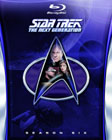

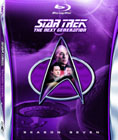


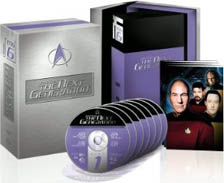


 (regular)
(regular)
 Import
Import
